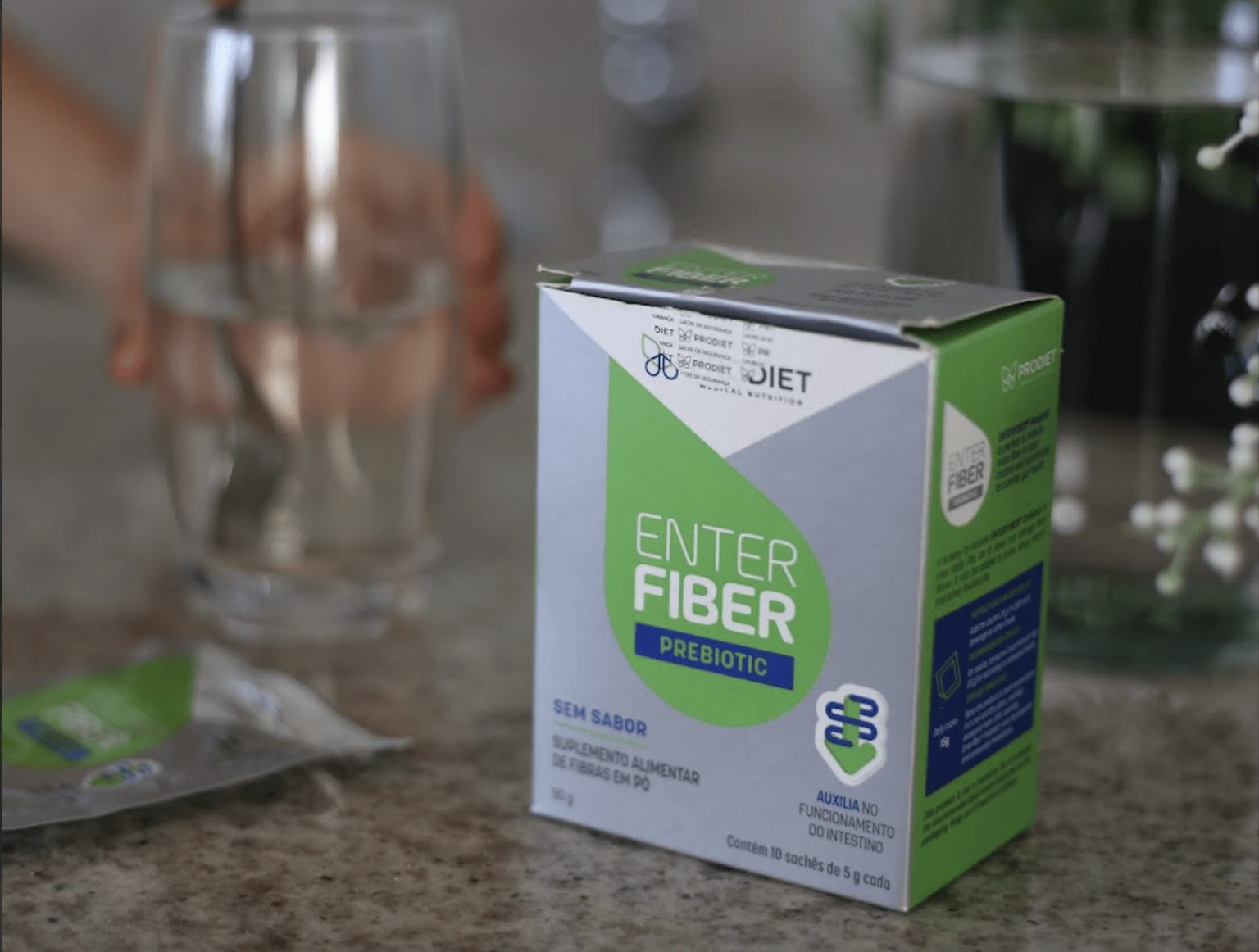Our intestines contain more than 100 trillion microorganisms, which together make up the intestinal flora. And in order to stay healthy, we need to keep our intestinal microbiota balanced by regularly consuming probiotics and prebiotics.
Do you know what they are and what the difference is between them? Check out the content we've prepared to understand the benefits of each of them in a simple and uncomplicated way:
What are probiotics?
Probiotics are live microorganisms, the so-called "good" bacteria, which, when consumed properly, promote the balance of the intestinal microbiota.
What is the difference between prebiotics and probiotics?
Prebiotics, on the other hand, are non-digestible food components derived from carbohydrates, mainly fibers, which feed and contribute to the development of beneficial bacteria, the probiotics.
The more prebiotics in the body, the more the bacteria (probiotics) reproduce and ensure that the gut functions properly.
And what's bad for the microbiota?
Keep an eye out: Consuming too much sugar, saturated fats, cigarettes, alcohol, stress and a sedentary lifestyle are some of the habits that can damage and unbalance the intestinal microbiota.
The secret lies in maintaining an exercise routine accompanied by a healthy and balanced diet, without forgetting to drink plenty of water.
What are the benefits of consuming probiotics?
Probiotics, those invisible little allies, play crucial roles in our overall health. Let's take a closer look at some of the remarkable benefits these friendly bacteria provide:
- Significant Reduction in Total Cholesterol Levels with Decreased LDL: Probiotics have been shown to be effective in promoting a healthy lipid profile, contributing to the reduction of total cholesterol and LDL.
- Improved Protein Digestion: By optimizing the breakdown of proteins, probiotics facilitate the absorption of essential building blocks for the body.
- Increased Absorption of Vitamins and Minerals: By facilitating the absorption of nutrients, probiotics ensure that your body gets the most out of the benefits of food.
- Promoting Lactose Digestion in Intolerant Individuals: For those who struggle with lactose intolerance, probiotics can offer relief by aiding the digestion of this milk sugar.
- Stimulating the Immune System: By strengthening the body's natural defenses, probiotics play a crucial role in promoting immune health.
- Constipation relief: By regulating intestinal transit, probiotics can relieve constipation and promote regularity.
- Antihypertensive effects: Some probiotics have been shown to have beneficial effects in reducing blood pressure.
- Reduction of Helicobacter pylori Ulcerative Activity: By fighting harmful bacteria, probiotics can help reduce the ulcerative activity associated with Helicobacter pylori.
- Control of Colitis Induced by Rotavirus and Clostridium difficile: Probiotics have shown potential in controlling inflammatory intestinal conditions.
- Prevention of Urogenital Infections: By maintaining the balance of flora, probiotics can help prevent infections in the urogenital tract.
- Reduced risk of colon cancer: Studies suggest that regular consumption of probiotics may be associated with a lower risk of colon cancer.
These are just a few reasons why incorporating probiotics into your routine can be a wise choice for long-term health. Always consult a health professional for personalized advice.
How important is it for cancer patients?
For those facing the battle against cancer, every element of health support is crucial. Probiotics emerge as valuable allies in this challenging context, offering specific benefits that can positively impact the patient's journey. Let's explore the importance of these microorganisms:
- Strengthening the Immune System: Patients undergoing treatment often experience a suppression of the immune system. By strengthening the body's natural defenses, probiotics play a key role in resisting infections and promoting recovery.
- Relieving Side Effects: Cancer therapies often cause gastrointestinal side effects such as nausea, diarrhea and constipation. Probiotics can help relieve these symptoms by improving intestinal health.
- Digestive Health Support: Cancer therapies can negatively affect the balance of intestinal flora. Probiotics help restore this balance, improving digestion and the absorption of essential nutrients.
- Reducing Inflammation: Certain probiotics have demonstrated anti-inflammatory properties, which can be beneficial for cancer patients, as chronic inflammation can contribute to the development and progression of the disease.
- Weight Maintenance and Adequate Nutrition: Maintaining weight and ensuring adequate nutrition are common challenges during cancer treatment. Probiotics can play a role in the efficient absorption of nutrients and the regulation of body weight.
- Psychosocial balance: Mental health is an integral part of cancer treatment. Some studies suggest that the intestinal microbiota can influence emotional balance. In this sense, probiotics may play an indirect but significant role in patients' mental health.
It is imperative to emphasize that the inclusion of probiotics in the care plan should be discussed with the medical team, taking into account the unique circumstances of each patient. These bacteria offer valuable support, but their implementation must be carefully customized to ensure maximum benefits and safety.
What are the benefits of consuming prebiotics?
Prebiotics, although often in the shadow of their probiotic cousins, play a crucial role in promoting intestinal health and, by extension, the general health of the body. Let's explore the many benefits of these compounds:
- Stimulating the Growth of Beneficial Bacteria: Prebiotics are essentially non-digestible fibers that serve as food for the good bacteria in the gut. In doing so, they promote the growth and activity of probiotic bacteria, which are essential for digestive health.
- Improved intestinal health: By selectively feeding beneficial bacteria, prebiotics contribute to maintaining a healthy intestinal environment. This is crucial for preventing conditions such as irritable bowel syndrome and other gastrointestinal diseases.
- Strengthening the Immune System: A significant part of the immune system resides in the gastrointestinal tract. By promoting a healthy intestinal environment, probiotics help to activate and strengthen the body's natural defenses.
- Weight control: Some prebiotics have been associated with regulating appetite and body weight. By influencing the intestinal microbiota, they can positively affect weight-related metabolic processes.
- Glucose management: Studies indicate that prebiotics can influence the absorption of glucose in the intestine, contributing to stable blood sugar levels. This is especially relevant for people with diabetes or at risk of developing the condition.
- Promoting Cardiovascular Health: The fermentation of prebiotics in the colon can result in the production of beneficial substances such as short-chain fatty acids. These acids have been associated with lowering cholesterol levels and promoting cardiovascular health.
- Cognitive benefits: Although in the early stages of research, some studies suggest that intestinal health influences brain health. Prebiotics may indirectly contribute to cognitive health.
It is essential to emphasize that dietary diversity plays a crucial role in promoting a healthy intestinal microbiota.
What are prebiotic and probiotic foods?
By combining probiotic and prebiotic foods, you create a synergistic environment that favors the growth and activity of beneficial bacteria in your gut. This harmonious dance between microorganisms and fiber contributes significantly to digestive health and general well-being. Take advantage of these foods as part of a balanced diet to nourish your gut and strengthen your health:
Probiotics
Probiotics are live microorganisms which, when consumed in adequate quantities, confer health benefits on the host. They are found in fermented foods and, when integrated into the diet on a regular basis, can promote a healthy balance in the intestinal microbiota. Some of the foods rich in probiotics include:
- Yogurt: A popular source of probiotic bacteria, yogurt is not only delicious, but also offers digestive benefits.
- Kefir: A fermented drink containing a unique blend of beneficial bacteria and yeasts.
- Sauerkraut: Fermented cabbage that not only adds a tasty touch to dishes, but also provides a healthy dose of probiotics.
- Kimchi: A Korean delicacy made from fermented vegetables, mainly cabbage and radish, rich in good bacteria.
- Miso: A fermented soy-based paste widely used in Japanese cuisine.
- Pickles: Pickled vegetables can be a tasty and crunchy source of probiotics.
Prebiotics
Prebiotics are non-digestible fibers that serve as food for the beneficial bacteria in the gut, helping them to thrive. Including probiotic-rich foods in the diet is key to promoting a healthy intestinal environment. Some delicious options include:
- Garlic: As well as adding flavor to meals, garlic contains prebiotics that feed the good bacteria in the gut.
- Onion: Rich in prebiotic fibers, onions are versatile and can be incorporated into various recipes.
- Banana: A natural source of fructo-oligosaccharides (FOS), a form of prebiotic.
- Asparagus: These green vegetables provide a good dose of inulin, another prebiotic fiber.
- Artichoke: An excellent source of inulin, which stimulates the growth of beneficial bacteria.
- Barley: This whole grain contains beta-glucans, a form of prebiotic fiber.
What are symbiotic foods?
Symbiotic foods are true conductors in the symphony of digestive health, combining probiotic and prebiotic elements to create a truly harmonious experience for your gut.
This is a perfect example of cooperation in nature, where probiotic bacteria feed on prebiotic fibers, strengthening their presence and activity in the gut.
Examples of Symbiotic Foods:
- Yogurt with Inulin: A classic example where inulin (a prebiotic) is added to yogurt, creating a favorable environment for probiotic bacteria.
- Kefir with Fructo-oligosaccharides (FOS): A delicious combination, where kefir provides probiotics, while FOS offer the necessary sustenance.
- Kimchi with Garlic: The fermentation of kimchi brings probiotics, while garlic contributes its prebiotics.
Benefits of Symbiotic Foods:
- Microbiota balance: The combination of probiotics and prebiotics promotes a healthy intestinal environment.
- Improved digestion: They contribute to more efficient digestion, optimizing the absorption of nutrients.
- Refuge against pathogens: Strengthens intestinal defenses, making it more difficult for harmful bacteria to colonize.
Take care of your gut with this symphony of benefits and enjoy vibrant, resilient digestive health.
Conclusion
By understanding the difference between probiotics, the beneficial microscopic "superheroes", and prebiotics, the "nutrients" that feed them, we open the door to a holistic approach to digestive health.
The benefits are vast and range from reducing cholesterol levels to strengthening the immune system. The journey continues, as nutritional science is an ever-evolving field full of fascinating discoveries.

EnterFiber Prebiotic contains prebiotic fibers, polydextrose and fructooligosaccharides (FOS), which enrich the diet and promote the balance of intestinal flora, as well as contributing to immunity.
The sachet is very practical, it can be carried in your bag to accompany you on a daily basis and can be added to juices, water and yogurts, without adding any flavor.
Find your nearest distributor.
Did you like the tips? Follow us on Instagram, Facebook and LinkedIn and keep up with our news.






